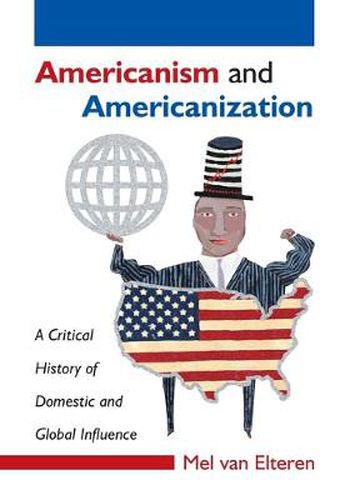Readings Newsletter
Become a Readings Member to make your shopping experience even easier.
Sign in or sign up for free!
You’re not far away from qualifying for FREE standard shipping within Australia
You’ve qualified for FREE standard shipping within Australia
The cart is loading…






This title is printed to order. This book may have been self-published. If so, we cannot guarantee the quality of the content. In the main most books will have gone through the editing process however some may not. We therefore suggest that you be aware of this before ordering this book. If in doubt check either the author or publisher’s details as we are unable to accept any returns unless they are faulty. Please contact us if you have any questions.
With the current state of foreign affairs, the terms
Americanism
and
Americanization
sometimes take on an unexpected - and an unflattering - connotation. Americanism essentially involves local settings outside the United States that are in some way related or attributed to American influence. While the validity of this influence may be under scrutiny, it requires a detailed historical - and sometimes cultural - analysis to understand all the dynamics and implications of Americanization. A variety of factors contributes to this influence, including the preoccupation and reception of the relevant culture itself. For instance, many European countries have at times demonstrated a preoccupation with all things American - a preoccupation which was not necessarily swayed by any action of America itself. The overall actualization of Americanization, however, encompasses a number of societal dimensions. Focusing on the twentieth and twenty-first centuries, this volume presents an in-depth critical analysis of the Americanization process. Beginning with a survey of early European preoccupations with all things American, the book goes on to discuss European concerns regarding American influence after World War II. The work then looks at Americanism and its influence within the United States itself, especially regarding developments during the New Deal and beyond. The primary goal of the analysis is the construction of an interpretative framework, allowing for a more balanced approach to the study of Americanism abroad. Written from a critical, social-emancipatory perspective, the author’s approach blends economic, military, social, political and psychological dimensions as well as an examination of the ways in which these disciplines interact. Finally, Americanism is examined as part of a U.S.-style corporate globalization.
$9.00 standard shipping within Australia
FREE standard shipping within Australia for orders over $100.00
Express & International shipping calculated at checkout
This title is printed to order. This book may have been self-published. If so, we cannot guarantee the quality of the content. In the main most books will have gone through the editing process however some may not. We therefore suggest that you be aware of this before ordering this book. If in doubt check either the author or publisher’s details as we are unable to accept any returns unless they are faulty. Please contact us if you have any questions.
With the current state of foreign affairs, the terms
Americanism
and
Americanization
sometimes take on an unexpected - and an unflattering - connotation. Americanism essentially involves local settings outside the United States that are in some way related or attributed to American influence. While the validity of this influence may be under scrutiny, it requires a detailed historical - and sometimes cultural - analysis to understand all the dynamics and implications of Americanization. A variety of factors contributes to this influence, including the preoccupation and reception of the relevant culture itself. For instance, many European countries have at times demonstrated a preoccupation with all things American - a preoccupation which was not necessarily swayed by any action of America itself. The overall actualization of Americanization, however, encompasses a number of societal dimensions. Focusing on the twentieth and twenty-first centuries, this volume presents an in-depth critical analysis of the Americanization process. Beginning with a survey of early European preoccupations with all things American, the book goes on to discuss European concerns regarding American influence after World War II. The work then looks at Americanism and its influence within the United States itself, especially regarding developments during the New Deal and beyond. The primary goal of the analysis is the construction of an interpretative framework, allowing for a more balanced approach to the study of Americanism abroad. Written from a critical, social-emancipatory perspective, the author’s approach blends economic, military, social, political and psychological dimensions as well as an examination of the ways in which these disciplines interact. Finally, Americanism is examined as part of a U.S.-style corporate globalization.